This can not be better than US capital gain law. In US, if the property you selling is a rental, you can do 1031 exchange, avoid all the gain tax (defer), if the property is for your own use, you can wave half a million dollars of gain (for a couple), for average people, you keep the property for a few years or 10 year, you can walk away 500k dollar gain with zero tax. And you can claim repairs and upgrade, maybe can get away of 700k-800k. The best part, it's all self report at the end of the year, there is no AFIP to control you every step you are preparing the sale.
For example (real story), you buy a house in San Fran area for 250k in 1995, and sell it in 2008 for 750k, without paying any tax, buy another for 800k in 2008, by now the house is probably worth 1.6m. You can sell your house for 1.6m with almost zero tax, take the 1.6m as your retirement money and move to a different house in a different state. All together, you avoid paying tax for 1.35m capital gain. The two houses talked here are humble houses of Cali middle class house, small and average looking.
If you do this once, you have save yourself 1m for retirement, if you do this 2/3 times, become an active small time real estate investors, you get yourself a few m dollars easily over the course of 25 years, while you work on a normal job.

